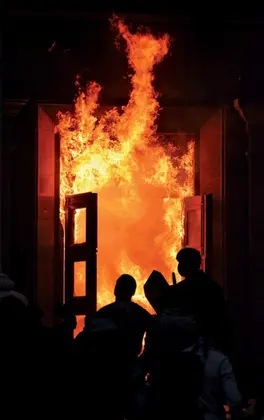Vitaliy Sakal, Ukraine’s deputy interior minister and chief
investigator, told journalists in Kyiv on May 19
that chloroform, a chemical that restricts the ability to breath, was discovered
by his investigative team inside the Trade Unions building.
“Chloroform was found in the
litter and soot when the House of Unions was being examined. Chloroform is
normally used in surgical operations. We have yet to establish why this
substance was there,” Sakal said.
JOIN US ON TELEGRAM
Follow our coverage of the war on the @Kyivpost_official.
“According to experts, inhaling
chloroform vapors obstructs the breathing, which is what happened in our case.
The cause of the 32 deaths in Odessa on May 2 was heart failure and
breathlessness under the impact of an unidentified substance, not as a result of
the high temperature,” he said.
Sakal added that the mixture
containing chloroform had been in the Trade Unions building for several days.
“According to experts, if the
substance remains in the open air, it becomes toxic. Heating is not needed in
this case. Inhaling its vapors leads to irreparable damage for humans,” he
said.

Sakal said that an
investigation to determine the substance’s origin is ongoing and that Ukrainian
investigators have urged the Israeli Embassy to provide skilled professions to assist
Ukrainain specialists in the matter.
Forty-eight people
were killed and some 250 were injured during clashes between pro-Ukraine football
fanatics and pro-Russia separatists in Odessa on May 2. Thirty-two
people were suffocated and burned in the Trade Unions building as it was
engulfed in flames, six died from gunshot wounds and 10
were killed after they leapt from the buildings windows several stories.
Police are still investigating the
motive of the clashes. “Provocation is the most likely theory currently being
probed,” Sakal said.
He said investigators are probing
four theories: an order to extremist groups to destabilize the situation in
Ukraine; unlawful activity by Odessa regional authorities and police aimed at
discrediting the current central government; unchecked actions by football fans
and pro-Russia groups; and a provocation by radical individuals.
Arsen Avakov, the interior minister, on May 19 said the deaths were chiefly the fault of local politicians.
“A lot of various political forces took part in those events (in Odessa). What happened may not have been what they wanted at first, but it is a fact that they were involved and that local politicians played a leading role in initiating those riots,” Avakov said.
Among those involved, he said, were city council members, elections workers, police, relatives of former police officers and active anti-Maidan campaigners. Arrest warrants have been issued for some of the city council members, he added.
Sakal said 12 people had already been arrested in connection with deadly May 2 clashes, and another 22 are suspected of complicity. Their names were not disclosed.
In Moscow, Russian Foreign Minister Sergei Lavrov
called on Ukrainian lawmakers to open up the Odessa tragedy to international
investigation.
“We will demand that the investigation be objective
and impartial, and in order for that to happen it has to be international. I
have sent relevant letters to the UN secretary general and the OSCE secretary
general,” he told journalists at a press conference in the Russian capital on May 19.
Lavrov said that the “Ukrainian authorities and those
who are defending them cannot avoid answering these questions,” adding
that “the Odessa massacre, Odessa bloodbath, and Odessa pogrom cannot be
ignored by the OSCE and the UN.”
Human Rights Watch and Amnesty International also
called for international involvement in the investigation in a joint statement
on May 8. “The authorities should keep the United Nations Office of the
High Commissioner for Human Rights (OHCHR) and the Organization for Security
and Cooperation in Europe (OSCE) informed of the progress of the
investigations, and when the investigations are completed the results should be
made public as soon as possible,” the organization said in a statement.
Kyiv Post editor Christopher J. Miller can be reached at miller@kyivpost.com and on Twitter at @ChristopherJM. Kyiv Post staff writer Isaac Webb can be reached at isaac.d.webb@gmail.com and on Twitter at @IsaacDWebb
You can also highlight the text and press Ctrl + Enter




